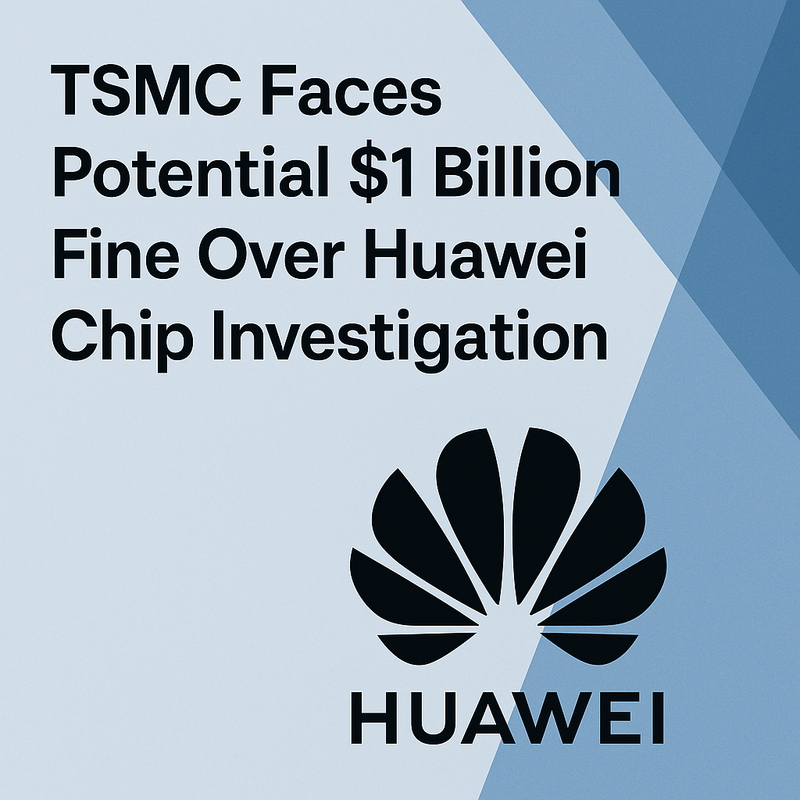Introduction
Taiwan Semiconductor Manufacturing Company (TSMC), the world’s largest contract chipmaker, may soon face a hefty fine—potentially exceeding $1 billion—as part of a U.S. export control investigation. The case revolves around TSMC-manufactured chips found in a Huawei AI processor, according to a Reuters report.
This development not only highlights the complexities of global supply chains but also signals growing scrutiny around semiconductor exports, especially when linked to Chinese tech giants.

Background on the TSMC-Huawei Situation
The issue surfaced in late 2024, when reports revealed that TSMC-manufactured components were embedded within a Huawei AI accelerator known as the Ascend 910B. The chips were allegedly funneled through Xiamen Sophgo Technologies, a Chinese chip designer affiliated with Bitmain, a major Bitcoin mining equipment manufacturer.
Though TSMC has stated it halted direct shipments to Huawei in mid-September 2020, the indirect supply chain relationship has raised red flags for U.S. authorities.
How TSMC’s Chips Were Allegedly Used
The scenario resembles a “nesting doll” arrangement. Here’s how it unfolded:
TSMC’s export-controlled AI chip dies were incorporated into Sophgo’s custom chip designs.
Sophgo’s chips were then embedded into Huawei’s Ascend 910B AI processors.
These processors are considered among the most sophisticated AI hardware produced in China, with hundreds of thousands reportedly manufactured using the implicated components.
Given the U.S. export restrictions aimed at curtailing China’s tech advancements, the discovery has escalated concerns significantly.
Why This Matters for the Semiconductor Industry
This situation is critical not only due to potential regulatory breaches but also because of the broader implications for the global tech landscape. With the semiconductor sector already grappling with geopolitical tensions, supply chain disruptions, and evolving compliance requirements, TSMC’s case highlights the need for businesses to implement rigorous due diligence processes.
For entrepreneurs, tech enthusiasts, and marketers looking to understand how tech regulations can impact innovation and market access, this story serves as a pivotal case study.
Timeline of Key Events
October 2024
TechInsights, a research firm based in Ottawa, disassembled Huawei’s 910B AI processor.
They discovered that the chipset inside resembled one manufactured by TSMC and customized by Sophgo.
Sophgo stated that it had no direct or indirect business dealings with Huawei and that the U.S. investigation did not involve its products.
November 2024
The U.S. Department of Commerce ordered TSMC to suspend shipments of advanced chips to Chinese firms, including Sophgo.
December 2024
The U.S. Commerce Department contemplated adding Sophgo to the U.S. Entity List (commonly known as the “blacklist”).
January 2025
The U.S. government officially blacklisted over twenty Chinese companies, including Zhipu AI and Sophgo, tightening restrictions further.
TSMC’s Commitment to Compliance
In an official statement, TSMC emphasized its dedication to adhering to all applicable laws, including export control regulations:
“TSMC is a law-abiding company and we are committed to complying with all applicable rules and regulations. If we identify any potential compliance issues, we act swiftly, including conducting internal investigations and notifying relevant authorities.”
Furthermore, TSMC proactively communicated with the U.S. Commerce Department regarding the matter and pledged ongoing cooperation.
Implications for Businesses and Tech Markets
For businesses operating in the tech industry, this case highlights the need to monitor regulatory landscapes closely. Compliance risks can arise not only through direct sales but also through complex, multi-tiered supply chains.
At Trenzest, we continuously track such developments to help entrepreneurs, marketers, and tech leaders stay informed. Whether you’re scaling a startup or managing a mature enterprise, understanding these global dynamics can empower you to make smarter strategic decisions.
Conclusion
TSMC’s potential $1 billion fine underscores the high stakes involved in today’s global semiconductor market. As supply chains grow more complex and regulations more stringent, businesses must remain vigilant and proactive.




